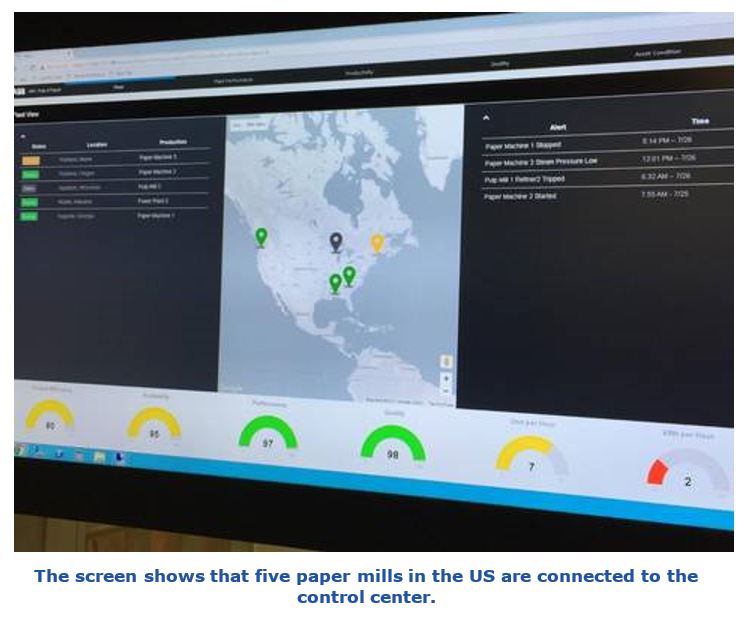

The ABB Ability Collaborative Operations Center (COC) in Westerville, Ohio is also home to ABB’s Pulp and Paper Center of Excellence in the US, and its Ability customers leverage ABB’s resident expertise to increase uptime, efficiency, and quality.
I recently had the opportunity to visit the ABB Ability Collaborative Operations Center (COC), one of several ABB has worldwide. These COCs allow ABB subject matter experts to monitor customer processes and provide timely advice to its customers. ABB provides this level of support for the marine, oil and gas, chemicals, mining, and power generation customers, as well.
Collaborative Operations utilizes the ABB Ability platform and cloud infrastructure to securely integrate and aggregate data from multiple sites. This data is automatically analyzed and continuously monitored by both customers and ABB experts in connected Collaborative Operations Centers, where asset and process discrepancies are identified, categorized, and prioritized for appropriate action. Customers collaborate with ABB as needed to leverage operational efforts. ARC has long evangelized that one of the clear opportunities from Industrial IoT and digital technologies for product suppliers is the opportunity to develop a much deeper and longer relationship with customers through provision of a far more sophisticated post-sale services offering.
During the tour, ABB provided an overview of the different levels of collaboration offered. ABB can monitor just the health of its equipment; drives, controllers, etc., or it has the pulp and paper expertise to help monitor, predict, troubleshoot, and resolve problems in the process. ABB personnel affect no changes on the process themselves. All work is done in conjunction with customer personnel on site. All screens/dashboards are shared between the two to ensure everyone is on the same page. Based on its expertise, ABB has developed several diagnostic predictors based on artificial intelligence. During the tour I was shown an application that would accurately predict the results of a ring crush test while there was still opportunity to correct it.

Today, rather than just a good basic understanding of control theory and instrumentation, process control professionals require a much broader variety of complex skillsets, many associated with very different disciplines. Acquiring and maintaining this diversity of required skills is a major challenge. In smaller facilities, this means process control personnel must become "jacks-of-all-trades and experts in none." This typically leads to stale skillsets and ineffective training.
Science, technology, engineering, and mathematics majors continue to graduate in relatively large numbers. However, while these graduates could step into the process control role, they are becoming more difficult to attract. The technology explosion has been universal, and these graduates are being pulled into other, potentially more glamorous industries.
Google and other internet companies, for example, seem to be attracting a disproportionate number of these technology-competent graduates with the skillsets that are so desperately needed in the industrial world. Given the choice to work on Google’s exciting self-driving car program in a state-of-the-art research facility, or in a vintage refinery (possibly equipped with a 1980s vintage control system and even older instrumentation), which would you choose? What if the choice included a state-of-the-art chemical complex?
This is one reason, ARC believes partnerships with vendors, like ABB’s Collaborative Operations Centers, will become the standard way of doing business.

